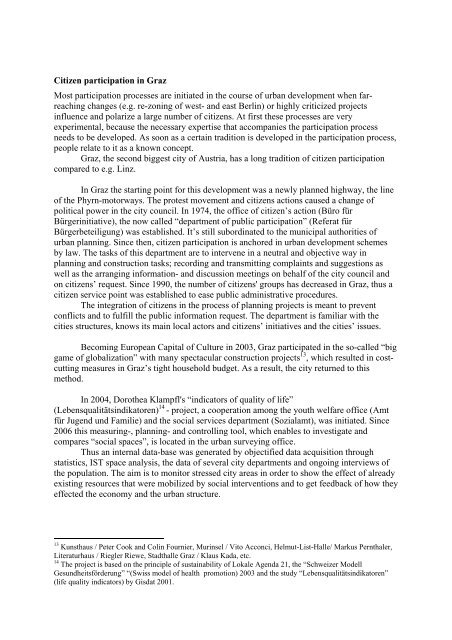HOW CAN PARTICIPATORY PRACTICES HAVE AN INPACT ON ...
HOW CAN PARTICIPATORY PRACTICES HAVE AN INPACT ON ...
HOW CAN PARTICIPATORY PRACTICES HAVE AN INPACT ON ...
You also want an ePaper? Increase the reach of your titles
YUMPU automatically turns print PDFs into web optimized ePapers that Google loves.
Citizen participation in Graz<br />
Most participation processes are initiated in the course of urban development when farreaching<br />
changes (e.g. re-zoning of west- and east Berlin) or highly criticized projects<br />
influence and polarize a large number of citizens. At first these processes are very<br />
experimental, because the necessary expertise that accompanies the participation process<br />
needs to be developed. As soon as a certain tradition is developed in the participation process,<br />
people relate to it as a known concept.<br />
Graz, the second biggest city of Austria, has a long tradition of citizen participation<br />
compared to e.g. Linz.<br />
In Graz the starting point for this development was a newly planned highway, the line<br />
of the Phyrn-motorways. The protest movement and citizens actions caused a change of<br />
political power in the city council. In 1974, the office of citizen’s action (Büro für<br />
Bürgerinitiative), the now called “department of public participation” (Referat für<br />
Bürgerbeteiligung) was established. It’s still subordinated to the municipal authorities of<br />
urban planning. Since then, citizen participation is anchored in urban development schemes<br />
by law. The tasks of this department are to intervene in a neutral and objective way in<br />
planning and construction tasks; recording and transmitting complaints and suggestions as<br />
well as the arranging information- and discussion meetings on behalf of the city council and<br />
on citizens’ request. Since 1990, the number of citizens' groups has decreased in Graz, thus a<br />
citizen service point was established to ease public administrative procedures.<br />
The integration of citizens in the process of planning projects is meant to prevent<br />
conflicts and to fulfill the public information request. The department is familiar with the<br />
cities structures, knows its main local actors and citizens’ initiatives and the cities’ issues.<br />
Becoming European Capital of Culture in 2003, Graz participated in the so-called “big<br />
game of globalization” with many spectacular construction projects 13 , which resulted in costcutting<br />
measures in Graz’s tight household budget. As a result, the city returned to this<br />
method.<br />
In 2004, Dorothea Klampfl's “indicators of quality of life”<br />
(Lebensqualitätsindikatoren) 14 - project, a cooperation among the youth welfare office (Amt<br />
für Jugend und Familie) and the social services department (Sozialamt), was initiated. Since<br />
2006 this measuring-, planning- and controlling tool, which enables to investigate and<br />
compares “social spaces”, is located in the urban surveying office.<br />
Thus an internal data-base was generated by objectified data acquisition through<br />
statistics, IST space analysis, the data of several city departments and ongoing interviews of<br />
the population. The aim is to monitor stressed city areas in order to show the effect of already<br />
existing resources that were mobilized by social interventions and to get feedback of how they<br />
effected the economy and the urban structure.<br />
13 Kunsthaus / Peter Cook and Colin Fournier, Murinsel / Vito Acconci, Helmut-List-Halle/ Markus Pernthaler,<br />
Literaturhaus / Riegler Riewe, Stadthalle Graz / Klaus Kada, etc.<br />
14 The project is based on the principle of sustainability of Lokale Agenda 21, the “Schweizer Modell<br />
Gesundheitsförderung” “(Swiss model of health promotion) 2003 and the study “Lebensqualitätsindikatoren”<br />
(life quality indicators) by Gisdat 2001.


